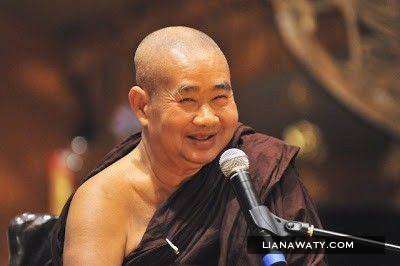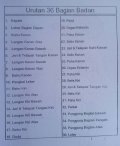Q and A with the most Venerable Pa-Auk Sayadaw

Q and A with the most Venerable Pa-Auk Sayadaw
Question : How does one not give up meditation after many failures caused by very many internal and external obstacles ?
Answer : You should have strong faith in the Buddha, the Dhamma and the Saṅgha. You should believe that what the Buddha says about the round of rebirths is true. Even if you have done many wholesome deeds in this life, if you still have not realised Nibbāna, you will have to go on in the round of rebirths, experiencing the sufferings of birth, ageing, sickness, death, etc. And if any of your unwholesome kamma ripens at the near-death moment in any life, you will be reborn in one of the four woeful states, even in hell, experiencing very severe suffering. In the Balapandita Sutta, the Discourse of Fools and Wise Men, the Buddha says to bhikkhus thus:
‘A fool who has given himself over to misconduct of body, speech, and mind, on the dissolution of the body, after death, reappears in a state of deprivation, in an unhappy destination, even in hell.
‘Were it rightly speaking to be said of anything: “That is utterly unwished for, utterly disagreeable,” it is of hell that, rightly speaking, this should be said, so much so that it is hard to find a simile for the suffering in hell.’
When this was said, a bhikkhu asked the Blessed One: ‘But, Venerable Sir, can a simile be given?’
‘It can be, bhikkhu,’ the Blessed One said. ‘Bhikkhus, suppose men caught a robber and presented him to the king, saying: “Sire, here is a robber. Order what punishment you will for him.” Then the king said: “Go and strike this man in the morning with a hundred spears.” And they struck him in the morning with a hundred spears. Then at noon the king asked: “How is that man?” -”Sire, he is still alive.” Then the king said: “Go and strike this man at noon with a hundred spears.” And they struck him at noon with a hundred spears. Then in the evening the king asked: “How is that man?” -”Sire, he is still alive.” Then the king said: “Go and strike this man in the evening with a hundred spears.” And they struck him in the evening with a hundred spears. What do you think, bhikkhus? Would that man experience pain and grief because of being struck with the three hundred spears?’
‘Venerable Sir, that man would experience pain and grief because of being struck with even one spear, let alone three hundred.’
Then, taking a small stone the size of his hand, the Blessed One addressed the bhikkhus thus: ‘What do you think, bhikkhus? Which is the greater, this small stone that I have taken, the size of my hand, or Himalaya, the king of mountains?’
‘Venerable Sir, the small stone that the Blessed One has taken, the size of his hand, does not count beside Himalaya, the king of mountains; it is not even a fraction, there is no comparison.’
‘So too, bhikkhus, the pain and grief that the man would experience because of being struck with the three hundred spears does not count beside the suffering of hell; it is not even a fraction, there is no comparison.
Now the wardens of hell torture him with the fivefold transfixing. They drive a red-hot iron stake through one hand, they drive a red-hot iron stake through another hand, they drive a red-hot iron stake through one foot, they drive a red-hot iron stake through another foot, they drive a red-hot iron stake through his belly. There he feels painful, racking, piercing feelings. Yet he does not die so long as that evil action has not exhausted its result.
Next the wardens of hell throw him down and pare him with axes. There he feels painful, racking, piercing feelings. Yet he does not die so long as that evil action has not exhausted its result.
Next the wardens of hell set him with his feet up and his head down and pare him with adzes. There he feels painful, racking, piercing feelings. Yet he does not die so long as that evil action has not exhausted its result.
Next the wardens of hell harness him to a chariot and drive him back and forth across burning ground, blazing, and glowing. There he feels painful, racking, piercing feelings. Yet he does not die so long as that evil action has not exhausted its result.
Next the wardens of hell make him climb up and down a great mound of burning coals, blazing, and glowing. There he feels painful, racking, piercing feelings. Yet he does not die so long as that evil action has not exhausted its result.
Next the wardens of hell take him feet up and head down and plunge him into a red-hot metal cauldron, burning, blazing, and glowing. He is cooked there in a swirl of froth. And as he is being cooked there in a swirl of froth, he is swept now up, now down, and now across. There he feels painful, racking, piercing feelings. Yet he does not die so long as that evil action has not exhausted its result.
Next the wardens of hell throw him into the Great Hell. Now as to that Great Hell, bhikkhus:
It has four corners and is built
With four doors, one set in each side,
Walled up with iron and all around
And shut in with an iron roof.
Its floor as well is made of iron
And heated till it glows with fire.
The range is a full hundred leagues
Which it covers all-pervasively.
Bhikkhus, I could tell you in many ways about hell. So much so that it is hard to find a simile for the suffering in hell.’
Here, I want to ask you: How do you feel if you light a lighter and use the fire to burn one of your fingers for a minute? Is it very painful? And now you should consider: How would you feel if your whole body were burned or boiled in hell for a long time? The Buddha does not mean to frighten us with what he says in the sutta, but just to show the facts, so that to arouse strong wholesome desire in us to practise to avoid falling into such a pathetic state.
If we have faith in the Buddha, we will have strong wholesome desire in us to practise, so as to escape from the suffering of the round of rebirths. This wholesome desire (Chanda) is the desire-basis for success, which is one of the four bases for success. Why it is called the basis for success? Because it helps us overcome various obstacles, and arouse the utmost energy to practise continuously until we achieve our aim. This kind of energy (Viriya) is another basis for success, namely, energy-basis for success. Apart from these two bases, we should also cultivate the other two bases for success, namely, mind-basis and investigation-basis for success. The mind-basis for success is the extreme fondness of mind towards and application of mind (Citta) into the Dhamma. Investigation (Vimaṁsa)-basis for success is wisdom, such as the wisdom arising from reflecting on the suffering of hell. If you want to develop the ability to continue practising the Dhamma even though you have met many failures, you should have unshakeable faith in the Buddha, the Dhamma and the Saṅgha, and cultivate the four bases for success.
In the Balapandita Sutta the Buddha gives a simile to show how long the fool has to suffer in the woeful states. There he says:
‘Suppose a man threw into the sea a yoke with one hole in it, and the east wind carried it to the west, and the west wind carried it to the east, and the north wind carried it to the south, and the south wind carried it to the north. Suppose there were a blind turtle that came up to the surface once at the end of each century. What do you think, bhikkhus? Would that blind turtle put his neck into that yoke with one hole in it?’
‘He might, Venerable Sir, sometime or other at the end of a long period.’
‘Bhikkhus, the blind turtle would take less time to put his neck into that yoke with a single hole in it than a fool, once gone to perdition, would take to regain the human state, I say. Why is that? Because there is no practising of the Dhamma there, no practising of what is righteous, no doing of what is wholesome, no performance of merit. There, mutual devouring and the slaughter of the weak prevails.’
From the blind turtle simile given by the Buddha, we know clearly that once a person has fallen into a woeful state, the time he has to pass in order to regain the human state is very hard to imagine. Here, let me ask you a question: Is it worthwhile to lead a heedless life, enjoy sensual pleasures for sixty or seventy years, without practising the Dhamma, and then experience the hellish suffering for thousands and millions of years? Let me tell you a story to show you how foolish it is to do that.
During the Kassapa Buddha’s time, there were four friends. They were sons of rich merchants. One day, they discussed what should they do in their life. One of them said: ‘With a Buddha so great and so good journeying from place to place, shall we give alms, perform works of merit, and keep the moral precepts?’ But none of them agreed to the proposal. One said: ‘Let us spend our time drinking strong drink and eating savory meat. This would be a profitable way for us to spend our lives.’ Finally one said: ‘Friends, there is only one thing for us to do. There is no woman who will refuse to live with the man who gives her money. Let us offer money to other men’s wives and commit adultery with them.’ ‘Good, good!’ cried all of them, agreeing to his proposal.
From then onwards they sent money to beautiful women, one after another, and for twenty thousand years committed adultery. When they died, they were reborn in the Avici Hell, where they suffered torment during the interval between two Buddhas. Dying again, because the fruit of their evil deeds was not yet exhausted, they were reborn in the Iron Caldron Hell, sixty leagues in measure. After sinking for thirty thousand years, they reached the bottom, and after rising for thirty thousand years, they came again to the brim. Each one of them desired to pronounce a single stanza, but all they could do was to utter a single syllable apiece, ‘du’, ‘sa’, ‘na’ and ‘so’. Then they flopped over and sank back again into the Iron Caldron.
At that time, King Pasenadi was trying to kill a man so as to marry his beautiful wife. Because of that he was unable to sleep at night, and happened to hear the four terrible sounds. He was afraid that he would meet some danger. Under his chief queen Mallika’s advice, he went to see the Buddha to ask what do those sounds mean.
The Buddha explained to him the deeds done by the four foolish men and the results they got thereof. Then the Buddha recited the four stanzas left uncompleted by the four evildoers as follows:
An evil life we led, we who gave not what we had.
With all the wealth we had, we made no refuge for ourselves.
Sixty thousand years in all have we completed;
We are boiling in hell. When will the end come?
There is no end. From where comes an end?
No end appears; for both you and I committed sin.
Be sure that when I go hence and am reborn as a human being,
I shall be bountiful, keep the precepts and do much good.
The four foolish men met the Kassapa Buddha’s Dispensation, but they did not appreciate it. They repented only when they were reborn in hell, but then it was too late. Nowadays there are many people who have gained the human state which is hard to gain, and have met the Buddha’s Dispensation which is hard to meet, but most of them do not appreciate the Buddha’s teachings, and still indulge in sensual pleasures. Do you want to follow those foolish people?
If you do not want to lose the Buddha’s Dispensation which is hard to meet, and do not want to experience the suffering of hell, you should develop strong faith. You should believe that if you practise the three trainings of morality, concentration and wisdom according to the Buddha’s teachings, you can attain the stream-entry path and fruition, whereby you will never fall into the four woeful states again. And if you attain Arahantship, you will never be reborn again. Based on this strong faith, you should arouse strong and powerful wholesome desire and energy, and practise with perseverance until you attain Arahantship.
May you attain Arahantship as early as possible.
Untuk penjelasan Sutta lebih detail bisa liat di :
Majjhima Nikaya III, Maagandiya Sutta,III.3.9 Balapandita Sutta(129)
Jataka No.314 (Lohakumbhī-Jataka)
Dhammapada, Bāla Vagga, Verse 60
from post in facebook bySayalay Satimā





.jpeg)